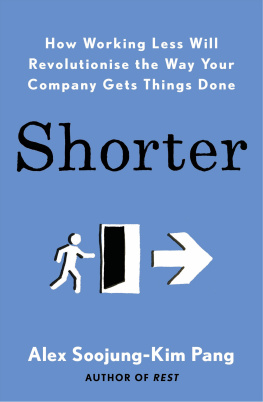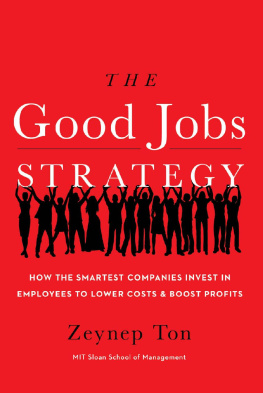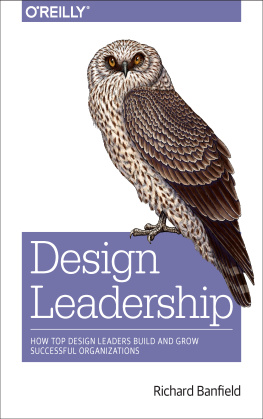About the Author
Alex Soojung-Kim Pang, PhD, has spent two decades studying people, technology, and the worlds they make. A Silicon Valleybased futurist and consultant, he has worked with governments and Fortune 500 companies; spoken at venues ranging from CIA headquarters to Shakespeares Globe Theatre to the Googleplex; and held academic positions at Stanford and Oxford universities. His last book, Rest: Why You Get More Done When You Work Less, is available in a dozen languages. Follow @askpang on Twitter and Instagram, or visit strategy.rest.
PENGUIN BOOKS
UK | USA | Canada | Ireland | Australia
India | New Zealand | South Africa
Penguin Books is part of the Penguin Random House group of companies whose addresses can be found at global.penguinrandomhouse.com.

First published in the United States of America by PublicAffairs,
an imprint of Perseus Books, LLC 2020
First published in Great Britain by Penguin Business 2020
Copyright Alex Soojung-Kim Pang, 2020
The moral right of the author has been asserted
ISBN: 978-0-241-98683-7
Follow us on LinkedIn: linkedin.com/company/penguinbusiness
This ebook is copyright material and must not be copied, reproduced, transferred, distributed, leased, licensed or publicly performed or used in any way except as specifically permitted in writing by the publishers, as allowed under the terms and conditions under which it was purchased or as strictly permitted by applicable copyright law. Any unauthorized distribution or use of this text may be a direct infringement of the authors and publishers rights and those responsible may be liable in law accordingly.
Alex Soojung-Kim Pang
SHORTER
How Working Less Will Revolutionize the Way your Company Gets Things Done

For Elizabeth and Daniel
If masters would always listen to the dictates of reason and humanity, they have frequently occasion rather to moderate, than to animate the application of many of their workmen. It will be found, I believe, in every sort of trade, that the man who works so moderately, as to be able to work constantly, not only preserves his health the longest, but, in the course of the year, executes the greatest quantity of work.
Adam Smith, The Wealth of Nations (1776)
The whole development of wealth rests on the creation of disposable time.
Karl Marx, Grundrisse (1858)
Introduction
MAIN STREET, HUNTINGTON BEACH, CALIFORNIA
When he first heard about the five-hour workday, David Rhoads thought, I want to give this to my employees.
David is CEO of Blue Street Capital, a Huntington Beach, Californiabased company that arranges financing for enterprise IT systems. Hes also an avid surfer: Huntington Beach is one of Southern Californias iconic surf towns, and Rhoads is in the water as much as I can, he tells me. So when he saw an article about how Tower Paddle Boardsan online, direct-to-consumer company that sells stand-up paddleboardshad moved to a five-hour workday, he was intrigued.
Stephan Aarstol founded Tower in 2010. An appearance on the TV show Shark Tank won him an investment from Mark Cuban, and the company had grown steadily since then. As an e-commerce company, Tower was constantly experimenting with new technologies and business processes, and Stephan was convinced that they could use the same technologies to change how his employees worked, not just how they sold paddleboards. If they focused on their most important work, cut out distractions, and used technology to automate routine tasks and make their hard jobs easier, he thought, they could dramatically improve their performanceand give him more time for surfing.
So in June 2015, Stephan offered his employees a deal: if you figure out how to do the same work in less time, you can keep the same salary and leave at 1:00 pm. He also implemented a 5 percent profit sharing plan, further increasing peoples hourly pay. Finally, he shifted focus away from revenue growth to building company culture.
What happened? The day they announced the change on their website, Tower broke its previous daily sales record and booked $50,000 in sales for the first time. They did it again a couple days later, and three more times in the next two weeks. By the end of the month, they had sold $1.4 million worth of paddleboards, breaking their previous monthly sales record by $600,000.
By the time David Rhoads read about the five-hour day, Tower Paddle Boards had been on the new schedule for nearly a year. It hadnt been easy, but it had been a great success: the company was one of the fastest growing in San Diego, customers saw the five-hour day as an expression of a work hard, play hard beach lifestyle, and revenues had gone from $5 million to $7.2 million.
You couldnt find two products more different than bespoke financial deals that fuel high-tech investments and surf equipment inspired by Polynesian sailors, but David started thinking about whether a shorter workweek could be implemented at Blue Street Capital too. He had run Blue Street since 2003, and after a couple brutal quarters, he was looking for ways for the company to improve and start taking on challenges again, rather than just responding to them. He had dedicated workers, but if we took out our breaks, took out our lunch, and took out all the [unproductive] nonsense that we do over the course of the day, he thought they could compress the workday to five hours. Theyd need to figure out how to keep customers happy during a shorter workdaycompanies depend on Blue Street Capital to help them finance mission-critical upgrades or expansions, and since every deal is different his employees spend a lot of time on the phone to clientsbut he was sure they could figure it out. We knew it would be a huge productivity tool for the business, David says, but we also knew we were going to get part of our lives back.
Business development manager Alex Gafford remembers David announcing the five-hour day at an all-hands meeting. I was kind of burned out that day, Alex tells me. It was after lunch, Im tired, and Im going to be in the office till at least five oclock doing emails and calls and stuff.
David says, All right, at the end of this meeting everybody can go home for the day, Alex remembers. We look at each other like, What? It was unexpected. Then David says, Hold on, let me explain what were going to do. Were going to try a ninety-day experiment.
David explained the idea, talked about Tower Paddle Boards, and explained why he wanted to try a five-hour day. I want you to have the lifestyle that I have, Alex recalls him saying, and I believe that youll be as successful as I am or more successful as a result. David answered a few questions. No, salaries wouldnt be cut. No, the company wasnt about to go under. Yes, the new schedule would become permanent after ninety days if productivity remained the same and if customers didnt complain. As one of the companys leading sales managers, Alex knew that the summer was a slow period at Blue Street, so it was a good time to start a trial.
During the trial, there were not really any other instructions, Alex recalls. We had to figure it out on our own. David had advice he had picked up from productivity expertsavoid multitasking, focus most of your effort on your most valuable work, take quick, purposeful breaks to stretch the muscles and get the blood flowingbut people were largely left to their own devices.






